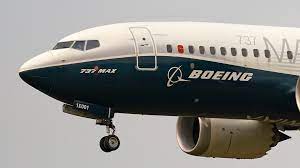The U.S. Federal Aviation Administration (FAA) announced on Friday the indefinite extension of the grounding of Boeing 737 MAX 9 airplanes for additional safety checks. The decision follows an incident where a cabin panel broke off a new jet mid-flight. As a result, the FAA plans to enhance its oversight of Boeing, including auditing the production line and suppliers of the Boeing 737 MAX 9.
While United Airlines and Alaska Airlines have canceled flights through Tuesday, the FAA stipulates that a new round of inspections must take place before the grounded jets can be considered for resumption of service.

Under the heightened supervision, the FAA aims to scrutinize the production process of the Boeing 737 MAX 9, and there is consideration of having an independent entity take on certain safety certification aspects previously assigned to Boeing. The continued grounding of 171 planes with the same configuration as the one involved in the incident is deemed necessary “for the safety of American travelers.”
Alaska Airlines and United Airlines, the two U.S. carriers utilizing the affected aircraft, have faced flight cancellations in the past week due to the grounding. Boeing shares closed down 2.2% on Friday and have declined nearly 12% since the incident on January 5.
The FAA’s decision comes as confidence in Boeing has been under scrutiny since the 2018 and 2019 MAX 8 crashes that resulted in 346 fatalities, prompting significant reforms in airplane certification by Congress.
The FAA Administrator, Mike Whitaker, revealed that the MAX 9 issues are perceived as a manufacturing problem rather than a design flaw. The National Transportation Safety Board (NTSB) is investigating potential issues with bolts in the Alaska Airlines incident.
Boeing committed to cooperating transparently with regulators, while supplier Spirit AeroSystems pledged support for the FAA’s audit of production and manufacturing processes.
Whitaker expressed the need to reevaluate the longstanding practice of delegating critical safety tasks to Boeing, suggesting the possibility of involving a third-party entity for higher oversight confidence.
Critics argue that budget constraints at the FAA led to excessive delegation to Boeing. The FAA has since reduced this practice. The aviation regulator increased staffing for Boeing oversight in 2021 and initiated an outside review of Boeing’s safety culture in January 2023.
The continued scrutiny and grounding of Boeing 737 MAX 9 highlight the challenges faced by the aviation industry in ensuring safety and restoring confidence in the wake of past incidents.









